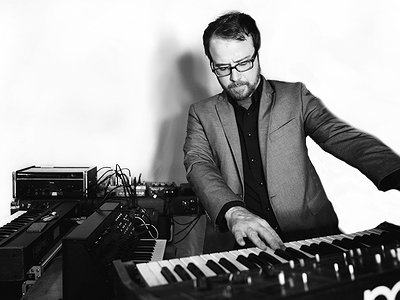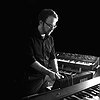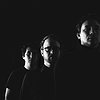There are many descriptions of the ideal state of mind for being creative. What is it like for you? What supports this ideal state of mind and what are distractions? Are there strategies to enter into this state more easily?
Distractions are everywhere for me. I like the idea of working from home but I have a difficult time with it. Cabin fever is a constant threat. The household chores are always looming: dishes, laundry, dealing with cats, paying bills. Social media is a blight. Emails ask to be answered.
Cycling has always been helpful. Nothing gets my mind going better than being out in the world, moving through it without the distractions of home. This is very often where ideas come from for me. I keep a deck of Oblique Strategies cards around for when I get stuck. I’ll also come up with ways to trick myself into writing. As I said, I think of myself as a collaborator so it’s often easier for me to work on something that’s already there. So sometimes I need a device for generating music. But really, a lot of it is just making the time to do the work. And it’s not always easy. Inspiration is nice but it’s a version of chance, and “chance favors the prepared mind”.
How is playing live and writing music in the studio connected? What do you achieve and draw from each experience personally? How do you see the relationship between improvisation and composition in this regard?
My compositional process is often rooted in improvisation. It’s rare that I sit down in the studio or anywhere else and decide to write something. More likely I’ll be fooling around with a piece of gear and something will start to happen, a pattern will emerge and I’ll begin to move in its direction. As well, improvisation plays a large role in Coupler’s performances. The music isn’t jazz but is influenced by jazz in the sense that there’s a loose rhythmic/harmonic/melodic structure that is transformed in the moment by the musicians on stage.
I did sessions in Nashville while I was living there and I feel like my skills as an improviser were handy. If you’re on a session, it’s expected that you’ll be able to come up with parts on the spot. This is a kind of improvisation, only rather than quickly moving on to the next thing, once you find something that works it has to be refined. But to me, all composition is rooted in improvisation. You go to an instrument and pull something new out of it. This is improvisation.
How do you see the relationship between the 'sound' aspects of music and the 'composition' aspects? How do you work with sound and timbre to meet certain production ideas and in which way can certain sounds already take on compositional qualities?
To me the two are so intertwined that they are largely indistinguishable. I’ve felt for a long time that what separates good electronic music from bad is sound selection. But increasingly I think this is true of all music. “A sound can be a hook” is something Rollum always says.
Because I work so much with synthesizers, shifting timbres are often a significant part of the content of the music. I like to create the impression that each sound is always in motion and shifting slightly in relation to the other sounds and the listener.
Our sense of hearing shares intriguing connections to other senses. From your experience, what are some of the most inspiring overlaps between different senses - and what do they tell us about the way our senses work? What happens to sound at its outermost borders?
I don’t consider myself synaesthetic but I’ve had the experience of different sounds and combinations of sounds creating impressions of different colors. I’ve also had some interesting auditory and visual hallucinations as a result of jetlag and sleep deprivation where my senses seemed to blur.
I spend a lot of time listening to ambient music at my apartment in Chicago. When the weather is nice I’ll open the windows and it’s at these times when you can hear ambient music doing the job it was meant to do. The sounds meld seamlessly into the hissing and whirring of the city beyond the window frames. Music becomes sound and sound becomes music. There is no distinction.
Art can be a purpose in its own right, but it can also directly feed back into everyday life, take on a social and political role and lead to more engagement. Can you describe your approach to art and being an artist?
For me art is largely a compulsion. I think most artists have neurotic tendencies of some kind that manifest in different ways. If you’re lucky, it’s making things. If not, maybe it’s substance abuse. Sometimes it’s a combination. But beyond the compulsion aspect, art, and music specifically, is a discipline and a way to organize life, a way to frame everything else.
It is remarkable, in a way, that we have arrived in the 21st century with the basic concept of music still intact. Do you have a vision of music, an idea of what music could be beyond its current form?
Eno often compares recorded music to film and television. This is a compelling idea I think. Film and television are outgrowths of theater but because of the technological possibilities of their respective mediums they aren’t expected to behave in the same way as theater. And they have different names. Yet we still call recorded music “music” in the same way that a symphony or live jazz band is called “music”. These new art forms never got new names even though much of recorded music, especially electronic music, is very often closer to sound design than it is to something you’d expect to see in a symphony hall. We still expect “authenticity” of performance even when confronted by something that is decidedly non-performative. The work doesn’t always comfortably fit the frame. So I think there’s a problem in the language we use to describe certain things. Should this be described as “music” or is it something else? If we can remove that frame or maybe move it slightly perhaps we can change our expectations and lose the baggage we bring to bear on these different situations. Then the concept of what we consider music can move beyond what it is now. Otherwise we risk violence to works that might simply be in the wrong context.




